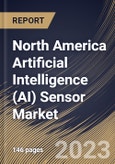The expanding use of IoT devices and connected systems fuels the demand for AI sensors. AI sensors make intelligent decision-making, automation, and predictive analytics possible, which are essential for gathering and processing data from IoT devices. Ongoing developments in AI algorithms, machine learning, and sensor technologies are also driving the artificial intelligence sensor market. These developments aid in creating more effective and powerful AI sensors, opening various applications across many industries.
The most significant advancements have been in AI-based sensors, especially in the human-machine interface. The contact between humans and machines is referred to as the human-machine interface (HMI), and it is essential for providing effortless interaction and control. Gestures, speech, and other AI-powered sensors have transformed HMIs by expanding their functionality and making them more simple, effective, and user-friendly. The market is expanding because there is a rising desire for human-machine interactions that are intelligent, intuitive, and personalized.
According to the National Library of Medicine, the American healthcare ecosystem is beginning to recognize the value of AI-powered technologies in the newest medical equipment. The operation and delivery of healthcare processes are expected to benefit from AI. For instance, the ability of AI to reduce costs for the healthcare system is a key factor in the adoption of applications of AI. The market is expected to increase in response to the rising adoption of AI technology across the region in different industry verticals.
The US market dominated the North America Artificial Intelligence (AI) Sensor Market by Country in 2022 and would continue to be a dominant market till 2030; thereby, achieving a market value of $9,538.2 million by 2030. The Canada market is experiencing a CAGR of 40.2% during (2023-2030). Additionally, The Mexico market should witness a CAGR of 39% during (2023-2030).
Based on Type, the market is segmented into Optical, Motion, Position, Pressure, Navigation, Temperature, Ultrasonic, and Others. Based on Technology, the market is segmented into Machine Learning, Natural Language Processing, Computer Vision, and Context-aware Computing. Based on Application, the market is segmented into Smart Home Automation, Healthcare, Automotive, Manufacturing, Robotics, Aerospace & Defense, Consumer Electronic, and Others. Based on countries, the market is segmented into U.S., Mexico, Canada, and Rest of North America.
The market research report covers the analysis of key stake holders of the market. Key companies profiled in the report include Robert Bosch GmbH, Sensata Technologies Holdings PLC, Sony Corporation, Baidu, Inc., BAE Systems PLC, Oracle Corporation, RELX PLC (LexisNexis Risk Solutions, Inc.), Sensirion AG, ACI Worldwide, Inc. and SAS Institute, Inc.
Scope of the Study
By Type
- Optical
- Motion
- Position
- Pressure
- Navigation
- Temperature
- Ultrasonic
- Others
By Technology
- Machine Learning
- Natural Language Processing
- Computer Vision
- Context-aware Computing
By Application
- Smart Home Automation
- Healthcare
- Automotive
- Manufacturing
- Robotics, Aerospace & Defense
- Consumer Electronic
- Others
By Country
- US
- Canada
- Mexico
- Rest of North America
Key Market Players
List of Companies Profiled in the Report:
- Robert Bosch GmbH
- Sensata Technologies Holdings PLC
- Sony Corporation
- Baidu, Inc.
- BAE Systems PLC
- Oracle Corporation
- RELX PLC (LexisNexis Risk Solutions, Inc.)
- Sensirion AG
- ACI Worldwide, Inc.
- SAS Institute, Inc.
Unique Offerings
- Exhaustive coverage
- The highest number of Market tables and figures
- Subscription-based model available
- Guaranteed best price
- Assured post sales research support with 10% customization free
Table of Contents
Companies Mentioned
- Robert Bosch GmbH
- Sensata Technologies Holdings PLC
- Sony Corporation
- Baidu, Inc.
- BAE Systems PLC
- Oracle Corporation
- RELX PLC (LexisNexis Risk Solutions, Inc.)
- Sensirion AG
- ACI Worldwide, Inc.
- SAS Institute, Inc.








